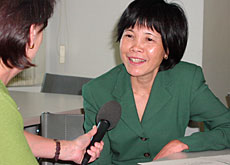Equality is the first casualty of crisis politics

Switzerland’s cabinet elections on December 10 shifted the government to the right, and left just one woman minister in the seven-member cabinet.
swissinfo asked Than Hyung Ballmer Cao, professor of gender politics at Geneva University, if the election marked a return to politics as an almost exclusively male occupation.
There have only ever been four women members of government in Switzerland, and each of them, in one way or another, faced obstacles in this predominantly man’s world.
December 10 was a case in point: parliament had the chance to elect three women to the seven-member cabinet.
Instead, it unseated the justice minister, Ruth Metzler, and denied support to candidate Christine Beerli, leaving Foreign Minister Micheline Calmy-Rey as the only woman in government.
swissinfo: What was your reaction to the elections for the Swiss cabinet?
Than Hyung Ballmer Cao: I was really disappointed. Switzerland had the opportunity to elect three women to government and it failed to do so. This was really a missed opportunity.
swissinfo: What does it tell us about Switzerland?
B.C.: I think it is a very bad sign internationally. Switzerland already has a bad image because of the very late introduction of the women’s vote [in 1971]. For a long time it has been viewed as a conservative country, and this is something which adds to that image.
swissinfo: Is it a fair image?
B.C: Yes and no. I think that to be the [second] last European country to introduce the vote for women is an important fact, which can’t be forgotten in a few years. But on the other hand, I think Switzerland has made huge progress during the past 20 years. To introduce the right to vote for women so late, and now to have more than 30 per cent of seats in parliament occupied by women – that is enormous progress.
swissinfo: What went wrong on December 10 then? Is this a step back?
B.C.:I think perhaps the political parties and also the political elite in Switzerland thought that the women’s question was solved, and that now they have more important issues to deal with. I think this was a big mistake, because equality – gender equality – is not something which can be reached automatically, it needs constant effort and action.
swissinfo: Women outside Switzerland often ask what’s wrong with Swiss women – why they aren’t more vocal. Do you think Swiss women have let themselves down?
B.C.: No, I don’t think so. I think that is perhaps a false image of Swiss women. Switzerland has a different political system. It has direct democracy so concrete issues can be voted on. The Swiss population – the electorate – has more opportunities to pronounce about concrete issues, and women can vote too.
swissinfo: Do Swiss women really want equality then? Are they doing enough?
B.C.: Swiss women are a conglomerate of several groups, and the definition of what equality is can vary very much from one group to another. If you speak, for example, to immigrant women or to academic women, their wishes, their definitions of equality and their needs are not the same. But I think that the desire for more equality, for equal opportunities, is there. Whether Swiss women are vocal enough about it, I don’t know.
swissinfo: There are a number of practical issues on the agenda at the moment, such as the introduction of paid maternity leave, increased provision of child care, and more regular school hours. What do you think their chances are with the new government?
B.C: Very bad. I think what is very regrettable today is that the government – when it talks… about saving money and about where it wants to save, the things that are cut are always at the expense of women. So, no, the chances of maternity leave being approved are not high.
swissinfo: Isn’t that really quite a big criticism of a wealthy western democracy – that it still can’t introduce maternity leave?
B.C.: Well, you speak about wealth, but the distribution of wealth is always a power question. Resources are always struggled over. It’s not a given that if one country is wealthy then everyone will get their fair share of that wealth.
swissinfo: What do you expect from this government?
B.C.: I think the will to save money is there. But I hope there is enough pressure among the population, among women’s organisations, that while there will be savings, they will not be made only at the expense of women and other disadvantaged groups.
swissinfo-interview: Imogen Foulkes
Two conservative politicians, Christoph Blocher and Hans-Rudolf Merz, have joined the seven-member cabinet, which now includes only one woman.
Blocher unseated the justice minister, Ruth Metzler, while Merz defeated a female candidate from within his own Radical Party.
Last weekend an estimated 15,000 people took to the streets of the capital, Bern, to protest against the under-representation of women in government.

In compliance with the JTI standards
More: SWI swissinfo.ch certified by the Journalism Trust Initiative












You can find an overview of ongoing debates with our journalists here . Please join us!
If you want to start a conversation about a topic raised in this article or want to report factual errors, email us at english@swissinfo.ch.